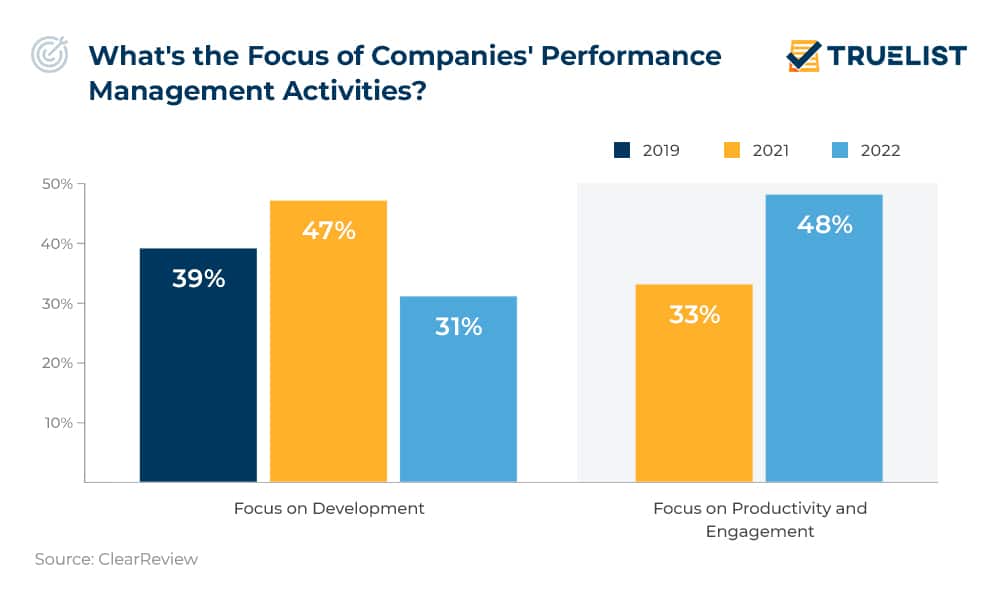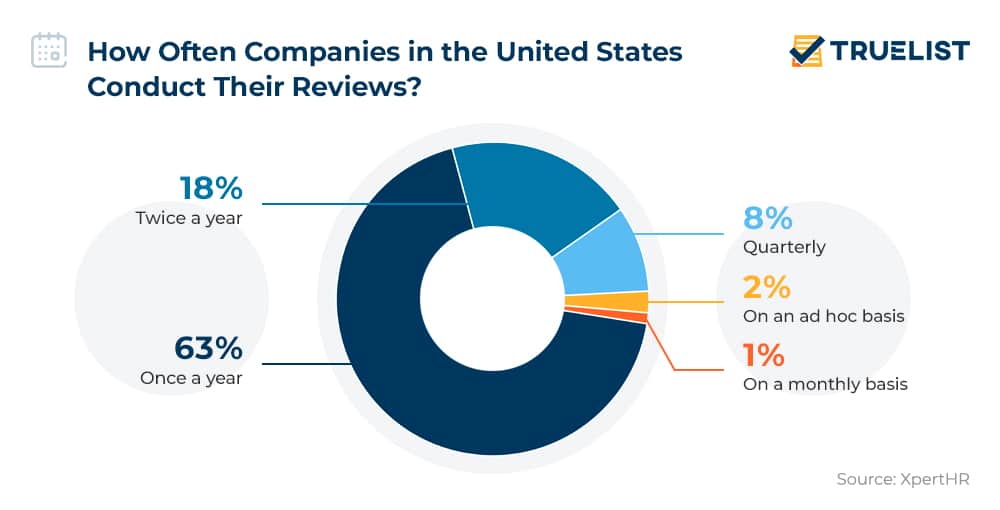What’s the exact value of performance management? At its core, it’s all about creating an environment where employees can perform to the best of their skills and produce top-notch work both effectively and efficiently. Performance management statistics indicate that while this strategic tool is widely accepted, it also has a lot of flaws. That’s the reason why we prepared these essential facts and stats so you can get a better insight, so tune in and stay with us.
Performance Management Statistics (Editor’s Choice)
- 98% of organizations believe performance management is important. (ClearCompany)
- 80% of employees prefer immediate feedback rather than waiting for annual performance management reviews. (EmploySure)
- 59% of workers think that traditional reviews have “no impact” on their performance. (TruQu)
- 32% of workers need to wait more than three months for feedback. (OfficeVibe)
- 64% of employees think the quality of the feedback they receive should be improved. (OfficeVibe)
Some General Statistics on Performance Management
1. Only 5% of managers are happy with traditional performance management reviews.
Is performance management without ratings better than traditional performance management? Well, according to the latest HR statistics, about 95% of human resource managers admit they are not satisfied with traditional performance management and think that there’s room for improvement. Employees don’t seem to be much more optimistic with 59% believing that traditional performance reviews don’t actually impact their performance.
(TruQu)
2. Only 2% of businesses think that performance management is not important.
Performance statistics show that 98% of organizations believe performance management is necessary. And yet, under two-thirds (64%) say they have the right approach to it.
(ClearCompany)
3. A whopping 81% of HR managers are making changes to traditional performance management.
According to a 2019 performance management benchmarking study conducted by Gartner, an even bigger number (82%) say performance management is not effective in meeting its primary goals. Performance stats further show that only 38% of HR managers see it as keeping up with business needs. That is why some industry professionals employ performance management software to align employee performance with the company’s business goals.
(Gartner)
4. 80% of employees would rather have immediate feedback than an annual performance review.
Most employees prefer immediate feedback on their work to waiting a year to learn how they are performing at work. Regular reviews — be it weekly, monthly, or quarterly — reduce the pressure and could potentially minimize errors, handling performance issues before they have had time to escalate. Employee engagement statistics further suggest that regular reviews make for more engaged staff.
(EmploySure)
5. Performance review statistics register that 89% of HR managers think that continuous performance management is more useful than traditional performance management.
It would seem that HR managers are in agreement with employees about the frequency of performance reviews. According to a recent study performed by HR Research Institute and BetterWorks, conducting performance management on an ongoing basis is way more effective than annual or bi-annual performance reviews. Experts argue that CPM results in more growth-oriented feedback, enabling employees to achieve their goals.
(HR)
6. Performance statistics show that 75% of HR managers agree that mentorship culture between managers and teams is a vital future element for high-performing workplaces.
Companies with the best performance management practices foster a culture that encourages collaboration and communication. Additionally, 83% of HR managers in the financial industry and 79% of HR managers working in retail agree that their respective sectors should focus on a mentoring culture going forward, with an emphasis on the constant exchange of feedback.
(Cision)
7. 22% of organizations are asking managers to focus more on behavior than outcomes when assessing performance.
There is a growing trend in organizations to focus more on behavior than outcome when assessing performance. According to the latest performance management statistics, only 12% of organizations are asking their managers to focus more on the outcome.
(HRD)
8. 65% of organizations in 2021 didn’t place performance management as one of their priorities.
Company performance management was not a top priority in 2021. According to the 2022 Clear Review’s report, 47% of businesses focused on employee development. This percentage, however, dropped to 31% in 2022. On the flip side, the focus on productivity and engagement is rising, the most recent productivity statistics show. 48% of organizations said they are focused on these aspects in 2022, while just 33% of them claimed the same the previous year.
(ClearReview)

Feedback Statistics
9. 76% of workers in a survey want feedback about their performance at least every month.
When it comes to how often workers want feedback about their performance at the company, most would want a response at least every month of the year. With this kind of practice, they think that when the time comes for their traditional annual performance review, there won’t be any surprises in regard to worker appraisal.
(TruQu)
10. Performance appraisal statistics reveal that only 10% of US-based employees felt engaged after receiving negative feedback about their work.
According to recent research conducted by Gallup, 10.4% of workers stateside felt engaged after receiving negative reviews about their job. On the other hand, around 30% of them began actively searching for a new job after receiving a manager’s negative feedback.
(SHRM)
11. 83% of employees truly appreciate receiving feedback about their work.
Regardless of whether it is positive or negative, most employees really want feedback from their managers in order to improve their performance at work. This means that creating a feedback culture in the workplace is among the most essential performance management best practices, and as a bonus, requires minimum investment.
(OfficeVibe)
12. 62% of employees said they wish to receive more feedback from their coworkers.
The latest feedback statistics show that it’s not just up to managers to nurture a culture of feedback in the workplace. Peer feedback will also be appreciated, especially with stats further showing that 83% of employees appreciate praises more than they do gifts.
(OfficeVibe)
13. 63% of organizations are still relying on annual feedback as a performance management method.
A 2021 survey by XpertHR conducted on 344 US-based companies found that 63% of these employers still conduct formal performance reviews once a year. The study also reveals that 18% of businesses conduct their reviews twice a year, while 8% of them do quarterly evaluations. 2% of companies perform reviews on an ad hoc basis, while only 1% of them make an effort to evaluate their employees on a monthly basis.
(XpertHR)

14. 32% of workers need to wait over three months to get feedback from their supervisor, feedback stats reveal.
A recent study found that about a third of employees have to wait more than three months before they get performance management feedback. This is not good news for those who need human interaction and support in order to reach excellence at work. Another 63% of employees meanwhile believe that they are not getting enough praise.
(OfficeVibe)
15. 64% of workers think the quality of the feedback they receive from their managers should be improved.
Performance management trends suggest that managers should not only give feedback for the sake of feedback but focus on quality. This is probably the reason why only half of managers feel that employees have acted on their feedback. 28% say that employees have not acted consistently, while 20% feel their feedback was not acted upon at all.
(OfficeVibe)
Conclusion
With traditional appraisal systems no longer working properly, employers need to focus on more modern strategies and tools such as employee engagement software if they want improved performance and committed workers. Performance management statistics meanwhile suggest that frequent, quality feedback, is the building block of enhanced employee performance, which ultimately will deliver better business outcomes.
Sources: TruQu, ClearCompany, Gartner, EmploySure, HR, Cision, HRD, ClearReview, SHRM, OfficeVibe, XpertHR

